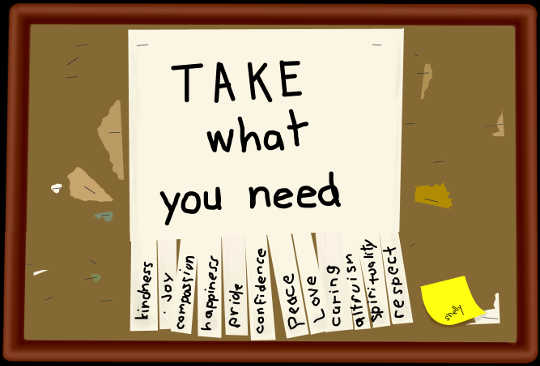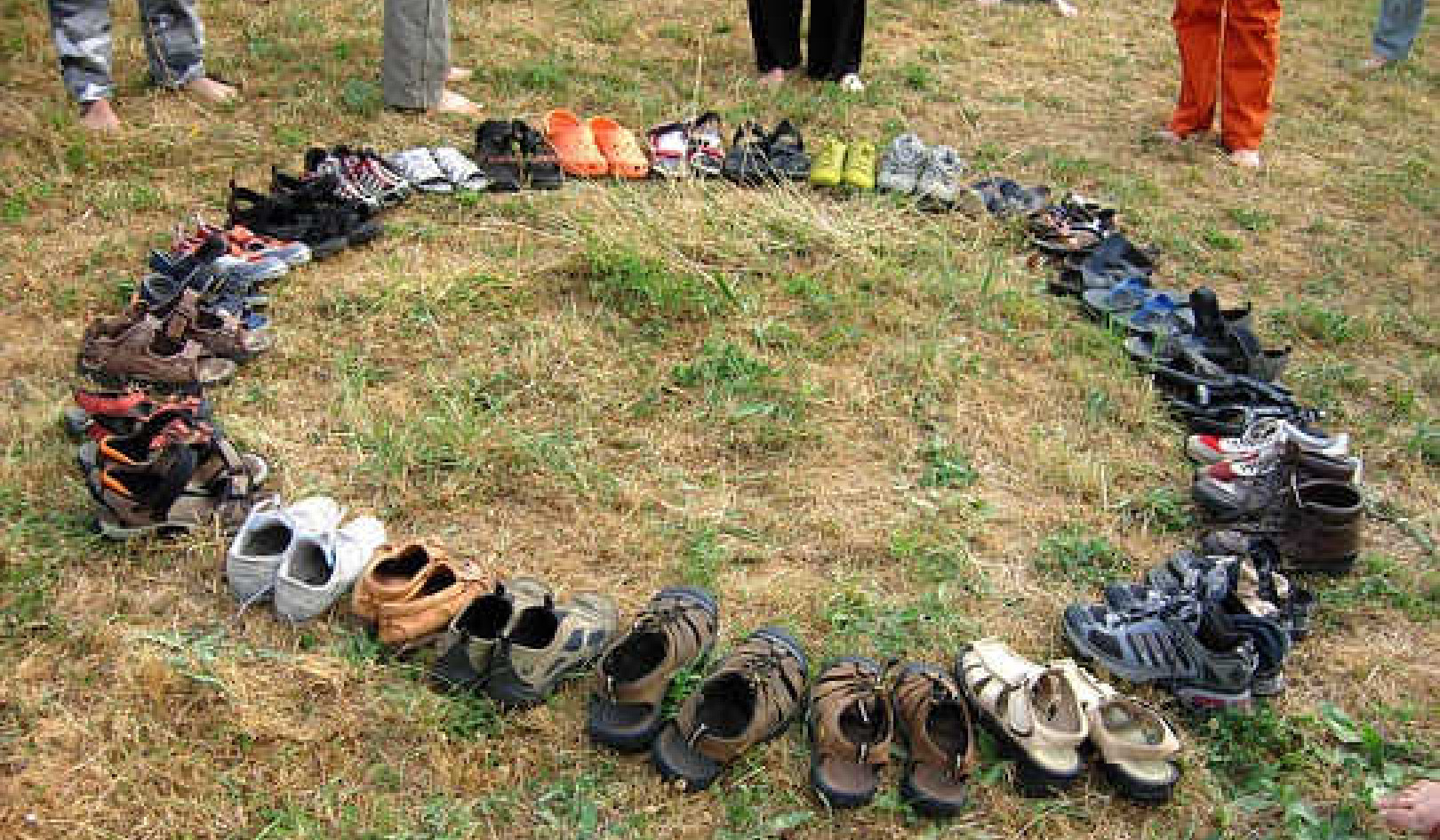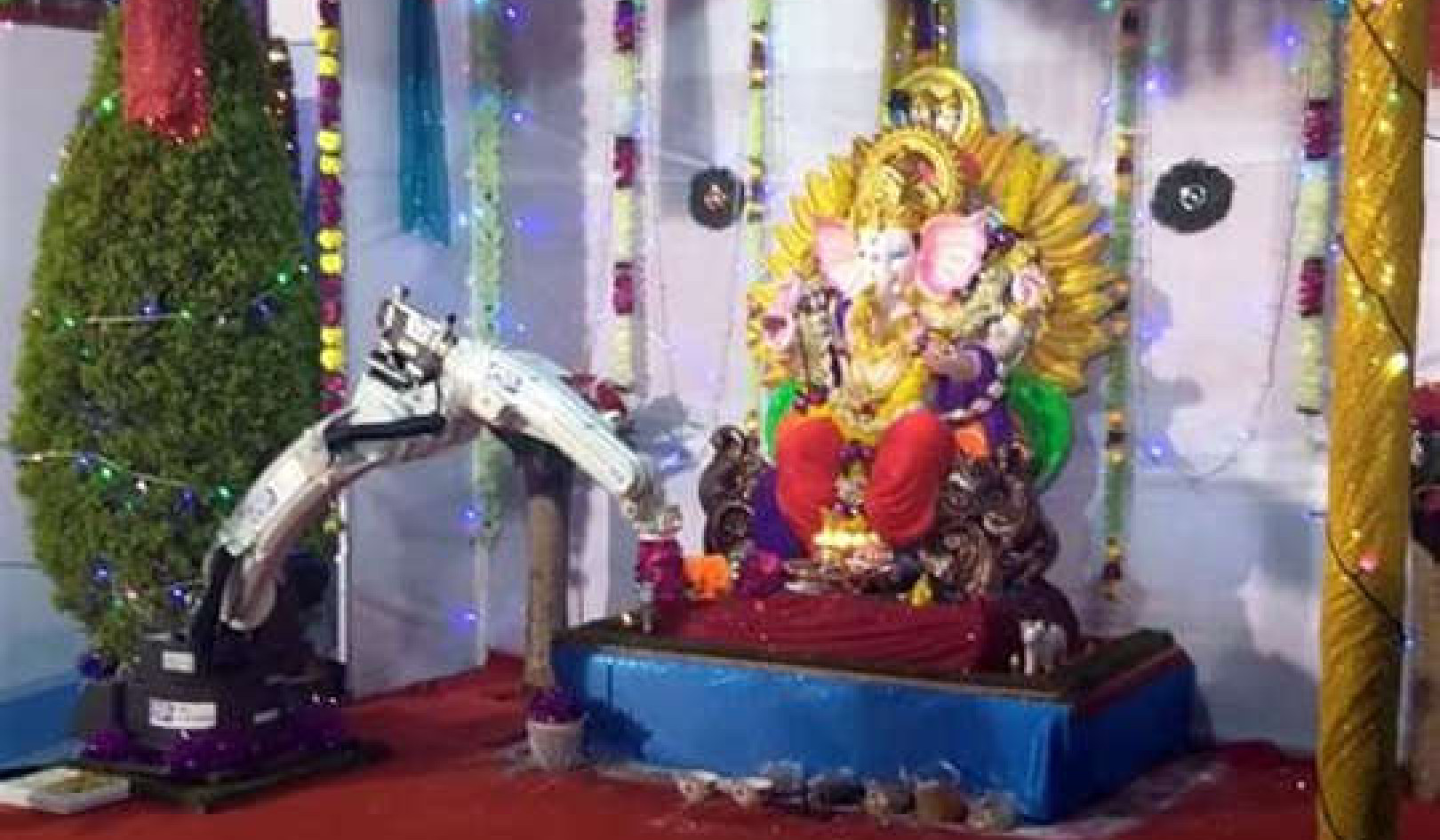
© 2014 Shelly ?•?•? . Licensed under CC-BY.
The elements of awareness encompass conscious knowing, the ability to read hearts, to be a healing, loving, compassionate presence, situated in the Now. They also encompass practical wisdom in every situation, the ability to enlarge perspective, to affirm others and promote dialogue and mutual understanding.
Awareness, as an enhanced consciousness and heightened sensitivity to others, allows us to take in more of reality than many can manage. But while awareness can be overwhelming, in most cases, a person with subtle awareness becomes a healing, loving, compassionate being. He or she is always looking for ways to respond to others and to assuage suffering. A person walking with awareness exudes a confidence that inspires and attracts others who see. A presence flows through the aware person, a grace and humility, a holiness and love. People who are truly aware communicate the depth of their inner consciousness, their nearness to God, or the Spirit, through their presence and their actions.
Most important, this awareness is always situated in the Now, in the integrity of the present moment with all its opportunities and challenges. I once heard the Trappist writer and abbot Basil Pennington talk about the life of the hermit. Near the end of his talk, he suddenly blurted out, "God is Now. Everything else is sin!" He was probably just trying to get our attention, but he said something very significant: that everything important is happening Now. God is Now. The Divine will embraces Now; to dwell on the past or the future misses the point. We must cultivate our awareness of Now, and the consciousness of this Now is the intersection, ultimately, of the vertical and horizontal.
In his classic work The Power of Now, the writer and teacher Eckhart Tolle emphasizes in great detail the utter reality of the Now. He has clearly seen that to understand the Now is the key to spiritual realization and enlightenment:
Have you ever experienced, done, thought, or felt anything outside the Now? Do you think you ever will? Is it possible for anything to happen or be outside the Now? The answer is obvious, is it not? Nothing ever happened in the past; it happened in the Now. Nothing will ever happen in the future; it will happen in the Now. What you think of as the past is a memory trace, stored in the mind, of a former Now. When you remember the past, you reactivate a memory trace -- and you do so now. The future is an imagined Now, a projection of the mind. When the future comes, it comes as the Now. When you think of the future, you do it now. Past and future obviously have no reality of their own. Just as the moon has no light of its own, but can only reflect the light of the sun, so are past and future only pale reflections of the light, power, and reality of the eternal present. Their reality is "borrowed" from the Now.
Just as all reality is mediated through consciousness, all time exists in the Now. This Now, however, exists only in consciousness, in the vast, eternal awareness of the Divine itself.
Wisdom
Another element of awareness is wisdom. In its horizontal dimension, wisdom means the knowledge of what is good, necessary, and appropriate. It is, first and foremost, knowing the truth of every situation one encounters. Solomon applied his celebrated wisdom to the difficult case of the two women who claimed the same infant; the king had to decide who was telling the truth. He ordered the baby to be cut in half, knowing that the real mother would rather give up the child than allow it to be harmed in any way.
When Jesus encountered the woman accused of adultery, the scribes and Pharisees wanted to trap him. Mosaic law required that a woman caught in the act of adultery be stoned to death, and they wanted him to stone her. Jesus intuitively knew the wise course, what was truly just and compassionate. "'Let the one among you who is guiltless be the first to throw a stone at her,' he said. When they heard this they went away one by one."
Both Christ and Solomon possessed the necessary perspective and wisdom for understanding the situations in which they found themselves. Solomon possessed a deep knowledge of human nature. Christ juxtaposed Mosaic law with the crowd's private sins. He knew they were all guilty and so was able to stir the shame of the tricksters.
In a similar way, Buddhists like Thich Nhat Hanh call for a larger perspective when they suggest that we search for someone's motivation in a confrontational situation. When we enlarge our perspective to include understanding of the real motivations behind hateful or annoying acts, we realize that deep down we hold compassion even for those we think we despise. The spiritually aware person is profoundly attuned to the presence of the Divine in each encounter with others.
Wisely aware people, such as those in the interfaith movement, build bridges between communities. They promote dialogue, friendship, and mutual understanding. They understand that these activities break down the walls that have separated us for millennia. Always looking for common ground, the wise seek opportunities for conversation across the boundaries of difference. Although they remain conscious of differences among the religions and cultures of the world, they look for places of collaboration, building habits of cooperation. Awareness, in this context, is the realization that what unites us is more important, and in fact more substantial, than what divides us. Preserving relationships among religions, nations, cultures, communities, and families always serves the higher good.
Ongoing dialogue is vital in this process of preserving relationships. In the exchange of knowledge, relationships increase the possibility of awareness in the participants. As the Dalai Lama has so often remarked, "True dialogue is possible only between friends," for friends are naturally open to one another. This is why we must, through cultivating awareness, find common ground.
DIVINE AWARENESS
The Divine is pure sensitivity, infinite consciousness, cosmic awareness, and an unlimited heart that is wise beyond comprehension. [The Divine Heart, Wayne Teasdale] The Divine also possesses infinite intelligence -- not the cold, analytical type but essential warmheartedness. God is total heart. Love is the Spirit's only motivation. Nothing can exceed love in priority, the most comprehensive reality. We have little understanding of this kind of love; our experience of human love is so limited, both in time and experience, compared to Divine Love, which knows no such limits; it is boundless, creative, wise, holy, and humorous. It is always responding, always giving to us according to our nature and capacity.
God is also unlimited Light in every direction, an insight found in most of the spiritual traditions. Tibetan esotericism speaks of it as the Clear Light of the Void, which we encounter at the end of our lives. Christian tradition says, "God is Light in whom there is no darkness." [1 John 1:5] This is not simply a metaphor. The scientist Peter Russell, in his book From Science to God, sees a direct connection between light and consciousness, identifying them with God. The Divine is literally light too.
The Divine is also boundless stillness, the stillness we can touch in meditation, when we slow down and allow quiet to invade our awareness. "Stillness is the greatest revelation," as a powerful Taoist aphorism goes. When we experience stillness, in any situation, we are also encountering the Divine. Stillness is the stability and immutability of the Divine. What truly is in itself has no need to change or to become. Stillness is the Presence flowing from itself and into itself, the reality of a self-subsisting identity that is complete, perfect, and passionately wanting to share itself with all other beings. All reality is within the infinite Divine, which is of the nature of openness and expansion. We have only to be still, quiet, and listen, and we will hear the Divine's symphony.
AN AWARE HUMANITY
The above attributes would take root universally in an aware humanity. Such awareness would deepen and mature, sparking the social, political, and economic transformation of the human family. Enlightenment is the fullness of this awareness. This awareness on the moral level, in the existential requirement of each moment, is pure sensitivity. This depth of sensitivity embraces all; it regards everyone and everything, including other sentient beings, as having a precious value and dignity.
The center of awareness, of this sensitivity, this holy and active empathy, is consciousness -- what Ken Wilber aptly calls "the eye of Spirit":
When I rest in simple, clear, ever-present awareness, I am resting in intrinsic Spirit; I am in fact nothing other than witnessing Spirit itself. I do not become Spirit; I simply recognize the Spirit that I always already am. When I rest in simple, clear, ever-present awareness, I am the Witness of the World. I am the eye of Spirit. I see the world as God sees it. I see the world as the Goddess sees it. I see the world as Spirit sees it: every object an object of Beauty, every thing and event a gesture of the Great Perfection, every process a ripple in the pond of my own eternal Being, so much so that I do not stand apart as a separate witness, but find the witness is one taste with all that arises within it. The entire Kosmos arises in the eye of Spirit, in the I of Spirit, in my own intrinsic awareness, this simple ever-present state, and I am simply that." [Ken Wilber, The Eye of Spirit: An Integral Vision for a World Gone Slightly Mad]
Wilber has experienced that awareness that floods from his inner depths. He has discovered the Divine in the silence. It is to this profoundly urgent awareness that each one of us is called and destined. It is to this awareness that all monks or mystics are dedicated. There really is no other place to go and no other place to be. Ultimately, there is no escape from the eye of Spirit and the great joy, burden, and vision of the real inviting us to itself.
Reprinted with permission of the publisher, New World Library,
Novato, California. ©2002. www.newworldlibrary.com
Article Source
A Monk in the World: Cultivating a Spiritual Life
by Wayne Teasdale.
 Building on the success and insights of his first book, The Mystic Heart, Teasdale gives a compelling glimpse of the unique spiritual path he has followed, and how everyone can find their own internal monastery and bring spiritual practice into their busy lives.
Building on the success and insights of his first book, The Mystic Heart, Teasdale gives a compelling glimpse of the unique spiritual path he has followed, and how everyone can find their own internal monastery and bring spiritual practice into their busy lives.
Click here for more Info or to Order this book. Also available in other formats.
About the Author
 Brother Wayne Teasdale was a lay monk who combined the traditions of Christianity and Hinduism in the way of Christian sannyasa. An activist and teacher in building common ground between religions, Teasdale served on the board of trustees of the Parliament of the World's Religions. As a member of the Monastic Interreligious Dialogue, he helped draft their Universal Declaration on Nonviolence. He wss an adjunct professor at DePaul University, Columbia College, and the Catholic Theological Union, and coordinator of the Bede Griffiths International Trust. He is the author of The Mystic Heart, and A Monk in the World. He held an M.A. in philosophy from St. Joseph College and a Ph.D. in theology from Fordham University. Visit this website for more information on his life and teachings..
Brother Wayne Teasdale was a lay monk who combined the traditions of Christianity and Hinduism in the way of Christian sannyasa. An activist and teacher in building common ground between religions, Teasdale served on the board of trustees of the Parliament of the World's Religions. As a member of the Monastic Interreligious Dialogue, he helped draft their Universal Declaration on Nonviolence. He wss an adjunct professor at DePaul University, Columbia College, and the Catholic Theological Union, and coordinator of the Bede Griffiths International Trust. He is the author of The Mystic Heart, and A Monk in the World. He held an M.A. in philosophy from St. Joseph College and a Ph.D. in theology from Fordham University. Visit this website for more information on his life and teachings..






























